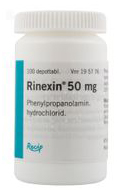Rinexin 25 mg and 50 mg Prolonged Release Tablets are Phenylpropanolamine Hydrochloride
What Rinexin Is And What Rinexin 50 Mg Uses For
Rinexin belongs to a group of medicines that are taken by mouth for a decongestant effect and are used in the treatment of colds and nasal congestion due to allergies or dilated blood vessels in the nasal mucosa.
Rinexin has a decongestant effect on the nasal mucosa, even in areas that cannot be reached by topical treatment with nasal drops. The effect is achieved by contracting the dilated blood vessels in the mucous membranes.
What You Need To Know Before Using Rinexin
Do Not Take Rinexin
- If you are allergic to phenylpropanolamine hydrochloride or any of the other ingredients of this medicine (listed in section 6).
- If you have hyperthyroidism ( hyperthyroidism ).
- If you have a tumor in the adrenal glands ( pheochromocytoma ).
Warnings And Cautions
Talk to your doctor or pharmacist before taking Rinexin if you have the following diseases:
- Diabetes
- Mechanical obstruction in the bladder neck or lower stomach
- Renal impairment ( renal failure )
- Enlarged prostate
- High blood pressure or other cardiovascular diseases
Rinexin may cause a dry mouth. Careful oral hygiene is therefore important during treatment.
Other Medicines And Rinexin
Tell your doctor or pharmacist if you are taking, have recently taken, or might take any other medicines.
The effect of the treatment can be affected if this medicine and some other medicines are taken at the same time.
Rinexin With Drink
It may potentiate the effects and side effects of caffeine. This should be taken into account when consuming caffeinated beverages, such as coffee and tea.
Pregnancy And Breastfeeding
If you are pregnant or breastfeeding, think you may be pregnant, or are planning to have a baby, ask your doctor or pharmacist for advice before taking this medicine.
No adverse effects on the fetus have been demonstrated.
Goes into breast milk but probably does not affect breastfed babies. However, consult a physician if you use it more than temporarily during breastfeeding.
Driving And Using Machines
No known effect on the ability to drive or use machines.
Rinexin Contains Lactose
If you have been told by your doctor that you have an intolerance to some sugars, contact your doctor before taking this medicine.
How To Use Rinexin
Always take this medicine exactly as your doctor or pharmacist has told you. If you are not sure, talk to your doctor or pharmacist.
Dose one should be determined by a physician, who will tailor it individually for the patient.
The recommended dose for adults and children over 12 years:
1 prolonged-release tablet of 50 mg morning and evening.
For younger children, the weaker tablet is given according to a doctor’s prescription. Dosage one depends on age.
It is a so-called mantle tablet that consists of a core surrounded by an outer layer. Both the core and the outer layer contain the active substance. The tablet must not be divided or chewed but must be swallowed whole.
From the outer layer, part of the active substance is released immediately. The rest is slowly dissolved out of the core. This gives a long-lasting effect and you get a satisfactory effect around the clock with just one dose morning and evening.
If You Take More Rinexin Than You Should
If you have ingested too much medicine or if e.g. If a child has ingested the medicine by mistake, contact a doctor or hospital for risk assessment and advice.
Symptoms of rinexin 25 mg overdose include
- Anxiety
- Aggression
- Depressive thoughts
- Fatigue
- Enlarged pupils
- Headache
- Dizziness
- Blurred vision
- Nausea
- Tremors
- Effects on heart rhythm
- Blood pressure
Possible Rinexin Side Effects
Like all medicines, Rinexin uses can cause side effects, although not everybody gets them.
Common (may affect up to 1 in 10 people):
- Nervousness and difficulty sleeping.
- Feeling dryness in the nose and mouth, careful oral hygiene is therefore important.
- Difficulty throwing water, especially in older men with enlarged prostate (bladder neck gland).
Uncommon Rinexin side effects (may affect up to 1 in 100 people):
- Hypersensitivity reaction
- Rash
- Itching
Rare (may affect up to 1 in 1,000 people):
- A transient rise in blood pressure
- Delusions
- Confusion
- Nightmares
- Aggressiveness
- Nervousness
- Difficulty sleeping
- Aggressiveness
Very rare Rinexin side effects (may affect up to 1 in 10,000 people):
- Cerebral hemorrhage
How To Store Rinexin
- Keep Rinexin 25 mg out of the sight and reach of children.
- Prolonged-release tablets 25 mg: No special storage instructions.
- Prolonged-release tablets 50 mg: 30 pcs (pressure100 pcs (plastic jar) No special storage instructions.
- Do not use this medicine after the expiry date which is stated on the label after EXP. The expiration date is the last day of the specified month.
- Medicines should not be disposed of via wastewater or household waste. Ask your pharmacist how to dispose of medicines no longer required. These measures will help to protect the environment.
Contents of the pack and other information
Content Declaration
- The active substances are phenylpropanolamine hydrochloride 25 mg and 50 mg respectively
- The other ingredients are
- Lactose monohydrate 132.5 mg and 230 mg respectively
- Maize starch
- Medium-chain triglycerides
- Tristearin
- Talc
- Gelatin
- Glycerol
- Magnesium stearate
- A polymer of polyvinylpyrrolidone vinyl acetate
- Anhydrous citric acid
What The Medicine Looks Like And The Contents Of The Pack
Prolonged-release tablets are 25 mg: White, cupped, film-coated tablets, diameter 8 mm
Prolonged-release tablets are 50 mg: White, cupped, film-coated tablets, diameter 10 mm
Pack sizes :
Prolonged-release tablet 25 mg: 30 pcs (pressure pack).
Prolonged-release tablet 50 mg: 30 pcs (pressure pack), 100 pcs (plastic jar).
Marketing Authorisation Holder
Meda AB
Box 906
170 09 Solna
Tel .: 08-630 1900
